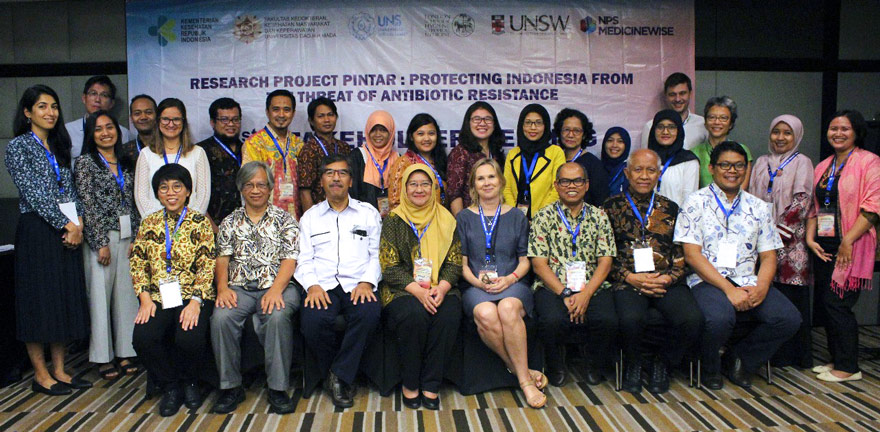New research shows that two-thirds of visits to private drug retail outlets resulted in the dispensing of antibiotics without a prescription
The problem of antimicrobial resistance – or AMR – is amplified by the incorrect or over-prescribing of antibiotics. It is a major and complex public health concern, as it causes infectious diseases to become resistant to the antibiotics used to treat them.
Researchers at the Kirby Institute at UNSW Sydney have been working with collaborators from the Universitas Gadjah Mada, Universitas Sebelas Maret, the Indonesian Ministry of Health, London School of Hygiene & Tropical Medicine, University College London, and The George Institute for Global Health at UNSW Sydney on a major study to improve antibiotic dispensing by community pharmacies and drug stores and combat the spread of AMR.
“In Indonesia, community pharmacies and drug stores are often conveniently located, trusted and accessible, providing an important source of essential medicines. But there are growing concerns about inappropriate dispensing practices in the community that drive AMR,” says Professor Virginia Wiseman from the Kirby Institute who is leading this study. “To address this, we first needed to understand the magnitude of this problem, so in partnership with the AMR National Taskforce led by the Indonesian Ministry of Health, we began a comprehensive programme of research to strengthen evidence in this area.”
Prof Wiseman and colleagues designed a study that used ‘mystery clients’ to visit private drug retail outlets in Bekasi city in West Java Province and Tabalong district in South Kalimantan Province. The mystery clients simulated different symptoms and recorded details of the interactions.
Over 495 different outlets were visited, with almost 70% of these visits resulting in the dispensing of antibiotics without a prescription, an act which is prohibited by law.
“The fact that over two-thirds of visits to outlets in Indonesia resulted in the sale of at least one antibiotic without a prescription and often with no advice, is very concerning,” says Prof Wiseman. “This includes the use of some second-line antibiotics which should only be prescribed in very specific circumstances.”
 PINTAR team
PINTAR team
Addressing profit-related pressure, regulation and cultural change
Dr Luh Putu Lila Wulandari, Research Fellow at the Kirby Institute, was first author on a paper published in BMJ Global Health that explored the findings of the research. She says that the qualitative component of the research helped to break down some of the reasons why staff were selling antibiotics without a prescription.
“Many felt pressured to by their clients, which highlights the complexity of this work. While there is a profit-making motivation for some dispensers, the reality that providing these medications without a prescription is considered the norm shows the need for both regulatory and cultural change around the dispensing of antibiotics,” she says.
There are significant health system pressures in Indonesia, made more complex by the current COVID-19 pandemic, but the researchers say that the largely unregulated dispensing of antibiotics needs to be addressed urgently. “In many ways COVID-19 has exacerbated the problem, with more people unwell or fearing they will become unwell, and seeking medical advice and medicines like antibiotics wherever they can find them,” says Prof Probandari from the Universitas Sebelas Maret and Gadjah Mada, one of the PINTAR Chief Investigators.
“A multi-faceted approach is needed, taking into account the profit-maximising motives of drug outlets, the high demand for antibiotics among clients, and the push from owners to compete with other outlets. The good news is that the Indonesian Ministry of Health is prioritising this and committing resources to finding practical health solutions.”
This research is conducted as part of the Protecting Indonesia from the Threat of Antibiotic Resistance (PINTAR) and is supported by a grant from the Indo-Pacific Centre for Health Security (DFAT) under the Australian Government’s Health Security Initiative. The PINTAR team is working in partnership with the Indonesian Government to develop strategies to improve antibiotic use in the private sector.
Learn more about the PINTAR Study at pintarstudy.org
Communications contacts
Kirby Institute: Luci Bamford, lbamford@kirby.unsw.edu.au, 0432 894 029
PINTAR: Débora Miranda, debbiemiranda@gmail.com
PINTAR Study Team
Chief Investigators
Professor Virginia Wiseman (The Kirby Institute, University of New South Wales, Australia, London School of Hygiene & Tropical Medicine)
Professor Ari Probandari (Faculty of Medicine, Universitas Sebelas Maret, Indonesia)
Associate Professor Mishal Khan (Department of Global Health and Development, London School of Hygiene & Tropical Medicine, UK)
Professor Tri Wibawa (Faculty of Medicine, Universitas Gadjah Mada, Indonesia)
Associate Professor Marco Liverani (Department of Global Health and Development, London School of Hygiene & Tropical Medicine, UK)
Professor Stephen Jan (The George Institute for Global Health, University of New South Wales, Australia)
Professor Shunmay Yeung (Department of Clinical Research, London School of Hygiene & Tropical Medicine, UK)
Professor John Kaldor (The Kirby Institute, University of New South Wales, Australia)
Professor Matthew Law (The Kirby Institute, University of New South Wales, Australia)
Professor Ric Day (St Vincent’s Clinical School, University of New South Wales, Australia)
Associate Investigators
Associate Professor Neha Batura (Institute for Global Health, University College London, UK)
Professor Rebecca Guy (The Kirby Institute, University of New South Wales, Australia)
Associate Professor Johanna Hanefeld (Department of Global Health and Development, London School of Hygiene & Tropical Medicine, UK)
Dr Harry Parathon (Antibiotic Resistance Control Committee, Indonesian Ministry of Health, Indonesia)
Dr Gill Schierhout (The George Institute for Global Health, University of New South Wales, Australia)
Research Fellows
Dr Luh Putu Lila Wulandari, PhD (The Kirby Institute, University of New South Wales, Australia)
Dr Astri Ferdiana, PhD (Center for Tropical Medicine, Universitas Gadjah Mada, Yogyakarta, Indonesia)
Dr Yusuf Ari Mashuri, MSc (Faculty of Medicine, Universitas Sebelas Maret, Indonesia)